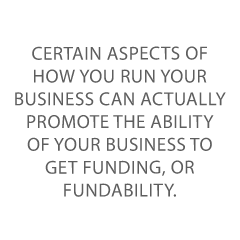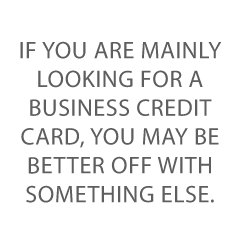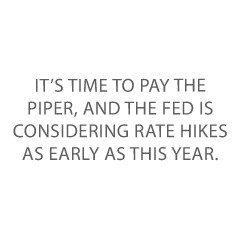
How to Strategically Use Every Day Business Operations to Promote Fundability
The way you run your business, the day-to-day operations, affects everything. From your reputation with customers to even your ability to get funding, all of it can be affected by business operations. This is why you have to be strategic.
Strategic Business Operations Can Promote Fundability
Most business owners do not realize this. They know that how they run their business affects success. However, most don’t get that the details of day-to-day business operations can affect fundability. Things like:
- Licensing
- Business bank accounts
- Merchant accounts (or lack thereof)
- Business website
- Even tools used to manage money
All of these can affect the ability of your business to get funding. It’s not just whether your business is fundable or not. Certain aspects of how you run your business can actually promote the ability of your business to get funding, or fundability.
Business Licenses
You may be thinking, ok, what’s the strategy here? Of course you need to have your business licenses. You may be surprised to know how many business owners never think to check licensing requirements. That is, until it is an issue.
Contact state, county, and city government offices to see if there are any required licenses and permits to operate your type of business. Licensing requirements differ based on state, town, and industry. Always make sure you have the proper licensing for your corporation. You don’t want the first time you consider licensing to be when a lender brings it up.
Business Bank Account
Some business owners start out trying to use one account for business and personal funds. But the best strategy is to have a bank account devoted strictly to your business from the beginning. If it’s too late to do it from the start, start now.
First, the IRS wants to see business funds and personal funds separated. Having a separate, devoted business bank account makes that much easier. Also, your business banking history is important when it comes to fundability. Another reason this is important is one that few realize. The date you open your business bank account is the day that lenders consider your business to have started.
Say you opened your business 10 years ago. Then, 6 months ago you opened a business bank account. If you try to get a loan today, the lender might consider you to have been in business for 6 months. The longer your business banking history, the better your borrowing potential is. Don’t wait to open a bank account just for your business.
Here’s yet another way having a business bank account is a smart business operations strategy. Without one, you cannot get a business merchant account. Without that, you can’t accept credit card payments. Studies show people spend more when they can use a credit card. Even if you do not have a need for that now, you may one day. If you already have a business bank account, you’ll be ready.
Web Domain and Professional Website
Yes, there is even a strategy for your business website and domain. First, you need a business website. Customers and lenders will be looking for one. Then, pay for it to be professionally designed. It has to be user friendly, and you do not want it to look thrown together. If customers or lenders see an unprofessional business website, it will not help you.
Next, pay for web hosting. A company like GoDaddy or HostGator is best. Try to avoid using free Weebly or Wix options. You want it to be your domain, not domain.wix.com. Your domain should be your business name, if possible.
Lastly, you need a company email address for your business that is on the same domain as your website. Use a professional email address such as yourname@yoursite.com. A website domain provider such as GoDaddy will often provide this for you.
Do not use Yahoo, AOL, Gmail, Hotmail or similar free email services.
Business Money Management
Managing small business finances can be overwhelming. There are a number of tools that can help streamline the process. Options like Brex, Divvy, Expensify, Lola, and more are growing in popularity. Not only can they help you manage funds, but some of them can help you build business credit if needed.
If you are a new business, it will be incredibly useful to choose a business money management tool that will also help you build business credit. There are not a lot that will do this, but there are a couple.
Brex
Brex is a business money management system. It works with your accounting software and allows you to track expenses. Depending on the level of service you choose, it can also help with paying bills and controlling spending.
They offer a couple of options. The easiest way to use Brex for both managing finances and building business credit is to open a Brex Cash account. Note, this is not a bank, but rather a banking alternative. However, they do have a partnership with the FDIC and your funds are secure.
Everyone that opens a Brex cash account gets a corporate card. It works just like a debit card, drawing from your Brex Cash balance daily. However, unlike a debit card, Brex reports these payments to Dun & Bradstreet, thus helping build your business credit score. That, in turn, helps to increase the fundability of your business.
Since this card is secured by the balance in your Brex cash account, and limited to that balance, you do not have to worry about underwriting. They have other money management options as well for those who qualify.
Divvy
Another business money management option that helps you build business credit is Divvy. It was formerly Bill.com. This company is very similar to Brex . In fact, in a direct comparison there are just a few differences.
First, Brex charges $5 per card for additional cards to team members, unless you pay for the premium account. Then you get unlimited cards. Divvy offers unlimited free cards.
There are also differences in budgeting, reimbursement options, and software integrations. For example, Divvy integrates with Quickbooks Online and NetSuite currently. Meanwhile, Brex’s integrations with Quickbooks Desktop and Xero are said to be coming soon.
Divvy also has an offline mode, and they do not currently offer the ability to trade in points for cryptocurrency. One other major difference is that Divvy reports to the Small Business Finance Exchange.
This is a data collection agency, not a credit reporting agency. Yet, they do provide data to their partners. These partners include some business credit reporting agencies. By reporting payments to the SBFE, Divvy indirectly provides information to all SBFE partners. This can definitely help build business credit more quickly.
You Can Strategically Use Business Operations to Promote Fundability
If you are careful in how you operate your business on a day to day basis, you can promote fundability. By handling certain business operations in an intentional and strategic way, you can increase your ability to get the business funding you need, when you need it.
The post How to Strategically Use Every Day Business Operations to Promote Fundability appeared first on Credit Suite.









